 Photo by Mariana Beltrán on Unsplash Photo by Mariana Beltrán on Unsplash I asked my dear friend, Linda, what she thought the difference between "simplicity" and "settling" were and her answer surprised me. "Simplicity asks, 'What do you truly want?''" She went on, "With settling, I may settle for what I don't want and since it's not what I want, I keep looking for it.'" Then she shared an example from her own life. Many years ago, a woman asked if she wanted a certain set of dishes for her wedding and if she did, this woman would buy them for her. She really did not want them, but she felt uncomfortable saying "no" so she received them as a wedding gift. Since she had them and could get more pieces to match, she expanded her collection of dishes she did not want but settled for. But she noticed something. Whenever she was at a store that sold dishes, she looked at the patterns. Years of time and energy were spent on looking for dishes when she already had a full set! Her longing was left unsatisfied because she had settled so many years ago, afraid of offending the gift-giver. Now having retired, she decided it was not too late and she knew what she wanted. Much to the surprise of her family (who never knew she did not like the dishes!), she decided to box up her collection and put them for sale on a neighborhood social media site . Then she went out and bought the dishes she truly wanted, a beautiful butterfly pattern. Another woman happened to see the dishes she had for sale and was overjoyed for she had been looking for those exact dishes because they reminded her of her mother! Both were full of joy and satisfied with their purchases. Guess what happened after that? My friend stopped looking for dishes! We went on to talk about how we tend to buy things that are only on sale or we get what is cheap because we can have "more" of the item. Sometimes this is okay, but when it becomes a pattern, our collection of unwanted, unused stuff grows along with our dissatisfaction which compares and wants more. What do you truly want? It can be a difficult question. We need to stop and think rather than compulsively or fearfully say "yes" to what we do not want (or allowing others to decide for us or think we should want what others have). Jesus often asked people like blind Bartimaeus, "What do you want me to do for you?" It's not that Jesus could not see what Bartimaeus wanted, He wanted Bartimaeus to "see" and say for himself! It is a simple question. Yet answering honestly may just simplify the amount of internal and external stuff that becomes a burden--now that's a gift! “Are you afraid of leaving your congregation alone in the dark with God?” I asked a pastor who simply could not understand why I would blow out all candles during a Longest Night Service.
He’s not alone. We tend to rush to bring light into darkness in the same way we rush to fill silence with sound. Pastors, especially so. They feel the weight of proclaiming and reminding. Wanting to make sure people know there is hope and “Jesus is the Light,” they constantly talk about hope, repeat Jesus’ name, and keep the lights on, candles burning. Honestly, they’re just as afraid of the dark as most. As a Spiritual Director, I’ve had plenty of pastors on silent retreats and plenty who don’t want to come at all because silence is scary. It seems unproductive and too revealing…which is more frightening?! Given my years as a church staff member and years working with church staff members, both are equally so. So much so, some never dare to come or they walk away from the discomfort never to return to a silent retreat. But discomfort is a doorway to deep transformation. And pastors can be like helicopter parents trying to shield those in their charge from the awkward and uncomfortable feelings that come with silence and darkness. But, have you ever experienced God in silence? In darkness? I have. I’ve also watched and listened to stories of how others have experienced God in silence and darkness. And guess what naturally arises? Hope. And guess where people discover the Light of Christ? Arising in their midst, even from within their very selves! After all, God is everywhere--within and without. The Psalmist proclaims in Psalm 139:12, “Darkness and light are alike to You.” Then he goes on to talk about God forming him in his mother’s womb (another place of darkness where God is present and at work). No lights needed. God is there. And are we not born from our mother’s womb and continue in the womb of the God in whom we live, and move, and have our being? Light and dark are part of every life and God is with us equally in both. Jesus taught that the Kingdom of God is in our midst, even within our very being (Luke 17:21). So we do not have to be afraid of the dark, the inner light never goes out. It just may take some time (& discomfort) to become aware of it. 14th century Persian poet, Hafiz of Shiraz, echoes this reality when saying, “I wish I could show you when you are lonely or in darkness the astonishing light of your own being.” For some reason this scares us, so we look to pastors to talk to us about the Kingdom rather than experience it for ourselves. However, when a pastor (or anyone!) dares to sit in the discomfort of darkness and silence, allowing uncomfortable feelings to emerge and giving themselves permission to rest from all the doing, they begin to radiate trust. This trust allows them to entrust those in their care to the discomfort of silence and darkness because they know God will meet each person in whatever way is needed. Right before an overnight silent retreat a person came up to me after dinner and in all seriousness said, "I'm on the verge of a panic attack the closer we get to going into the silence, I don't know if I can do this." I replied, "I can see why it's scary to you. Know there is a nurse here if needed. And, you're free to leave, but I hope you'll give the silence a try." The person stayed and now they sign up for almost every silent retreat! In befriending silence and darkness, the discovery is made that rather than be afraid of them, they in fact, can be a gift—an opportunity to be still and know that God is everywhere, in our mist, within our very being. A few weeks after talking to the one pastor, another emailed me and asked if her Presbyterian Church in North Carolina, could use my liturgy for their Longest Night Service. Mine had been the first liturgy she had come across that included blowing out candles and letting people simply be with God in the dark. She thought it would be powerful, especially this year, to let her congregation experience God’s presence in the darkness. I could not help but smile. _____________________________________
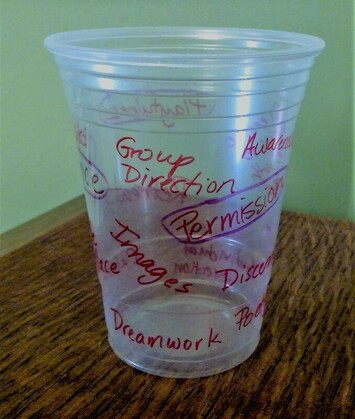 My own cup from the practice below My own cup from the practice below A young chaplain, exhausted and frazzled by her job in a busy hospital during this time of COVID and tending to her own young family, met with me online. She wanted to know why she simply could not do the self-care things that she encouraged others to do, especially during a time when she really needed them. I said, “Well, there were times when Jesus was exhausted, too. So if he was, you will be, too. And your soul probably doesn’t want anything else to do! Want some help in discovering what it wants instead?” Experiencing relief simply by being reminded that Jesus experienced exhaustion but also intrigued, she said yes and I had her go get a piece of paper and a pen. There’s a simple practice I developed for a silent retreat years ago that I still revisit with those in leadership or caregiving positions whether inside or outside the church. A cup or glass and a Sharpie are also an option but a journal and pen were easier for her. Note: You might want to stop reading and grab paper and pen, too! Then I walked her through these 3 Steps for Discovering Your Soul's Thirst:
She was surprised. First, by how quickly her cup filled up (she didn’t think she offered that much!) and more importantly, what she circled had nothing to do with another thing to do! Instead of another item on her to do list, her soul was craving the gifts of “presence” and “being seen.” This led to reflecting on her week and a guided prayer with Jesus. “Where have you been invited into or even experienced ‘presence’ and ‘being seen’ this week?” I asked her. She quickly realized that it was not in her times of trying hard to do self-care or connect to God during a formal service or quiet-time, but an out-of-the-spotlight interaction with two people in a hospital room had brought a deep feeling of connection, presence, and being seen. It was a holy moment being offered to her to savor once more. After a few moments, I asked her if she was interested in meeting with Jesus by the well that she’s been passing out cups of Living Water beside. She said “yes” and we moved into a time of guided prayer based on an interaction at a well between a Samaritan woman and the Jewish Jesus as described in John 4:4-10. When walking groups through this prayer, I offer a little more context that I didn’t need to do with the chaplain but will briefly offer here. In the story we discover that Jesus is physically tired and thirsty. The Samaritan woman is spiritually tired and thirsty, though she hasn’t admitted it yet. He asks her, a woman and enemy of the Jews, to help him with his physical thirst, later saying he can help with her spiritual thirst. He begins with his own vulnerability, his own parched soul. In so doing he reveals himself as a Friend of her Soul and promises he can give her Living Water that can become a wellspring within her, deep and lasting. She can draw from it at any time. This same promise is offered to our thirsty souls today. We don't have to wait for another time in the future, we don’t have to wait until chaos or external need subsides. Jesus is already waiting at the well, in the heat of the day. He begins with his own thirst which offers an invitation for another to be honest about hers. When we pause from passing out cups in Jesus' Name, we can hear with the Samaritan woman His words, “If you only knew what God is offering...you would have been the one to ask for a drink, and he would have given you living water.” Shall we ask for a drink? As you close your eyes, imagine the well you've been passing out cups of water beside. It may be a literal well or a metaphorical one, like your place of work. Whichever it is, you find Jesus waiting for you there. You might greet Jesus and allow him to greet you. Take in the scene with all of your senses (what do you see, hear, smell, taste, touch?). Be there a while and become aware of your thirst. What does your soul thirst for in this moment? You may have circled it on your cup. Trust, be curious, remembering that Jesus is a Friend of your Soul. Ask him for a drink of this water he's offering that deeply renews and restores. What is Jesus' response? Perhaps he offers a word, action, expression, instruction, or maybe he simply wants to be there with you... Allow the scene to unfold. You might continue a conversation like the Samaritan woman did or take a refreshing drink, or simply rest there, whatever your soul needs at this time. Be there with Jesus, drink deeply. I'll close with a prayer. (Silence) Says the prophet Isaiah, “Yahweh will always guide you, will satisfy your needs in the scorched land; he will give strength to your bones and you will be like a watered garden, like a flowing spring whose waters never run dry.” Says Jesus, “The water I shall give you will become in you a spring of water, welling up for eternal life.” Friend of Our Soul, may we drink deeply and discover within our own lives the ways you invite us to care for our souls even as we care for the souls of others. Amen. ________ At the end of our time, the young chaplain, calm and with a smile on her face, said, “Just what I needed. I’m still physically tired but my soul is invigorated. I can be both. That feels so good.”  Today I facilitated a time of meditation and guided prayer for the Vanderbilt Divinity School community during their online worship. Since we're all in this 2020 boat together, I'm offering the same to you! __________________________ Mark 4:35-36 (NRSV) 35 On that day, when evening had come, he said to them, “Let us go across to the other side.” 36 And leaving the crowd behind, they took him with them in the boat, just as he was. Other boats were with him. Mark 6:31-32 (NRSV) 31 He said to them, “Come away to a deserted place all by yourselves and rest a while.” For many were coming and going, and they had no leisure even to eat. 32 And they went away in the boat to a deserted place by themselves. ___________________________ After days full of crowds and constant activity (& sometimes during days full of crowds & constant activity!), what did Jesus and his disciples do? They climbed into a boat. The boat offered refuge—it was a safe place to teach from, to take a break from the pressing crowds, to find rest. It was also a safe place to wrestle—to struggle with and against the waves, to puzzle with what had just been learned or witnessed. And it was a threshold place—floating on the surface of the deep unknown, in-between where they’d come from and where they were going (which also meant into the unknown). It was a vehicle of both transportation and transformation. If we were to continue on with our particular Scripture passages we would know what they didn't know. They were about to face a furious storm (although it wouldn't disturb Jesus' sleep which would disturb them even more!) and their plans for their place of rest were going to be thwarted. Boat-time was liminal space for them, kind of like 2020 is for us. The boat itself was a liminal place for them, kind of like Vanderbilt is for many, kind of like this worship time is for us. So what might happen in this time of liminality? Will we discover an invitation to rest in the middle of the storm? If we loosen our grasp on our plans for the future, what will we do now? Let’s climb into the boat for some guided prayer and find out! I invite you to close your eyes, maybe raise your shoulders and sigh deeply allowing your shoulders to drop and other places of tension in your body to begin to release. Giving yourself permission to continue to be here rather than the task or place you’re headed to after worship. As you allow for some slow, relaxed breaths, let each one draw you to the present, this place where you experience the Sacred Presence. Now in the quiet, listen to Jesus speak the same words to you that he spoke to his disciples, “Come away to a deserted place all by yourselves and rest awhile.” (2x) Imagine yourself leaving whatever or whoever has kept you busy, worried or even excited today or whatever or whoever is presently keeping you preoccupied, imagine leaving it, leaving them, and climbing into the boat with Jesus. Take a moment to notice what the boat and your surroundings look like (they might be old or modern day). You might notice where you choose to sit, who else may be in the boat, just take in the scene with all of your senses, what do you hear, see, touch, taste… What is the weather and water like in this moment? What time of day is it? What state are you in—mind & body? While you’re looking forward to going to a place of rest, you don’t know what will be waiting for you in the future, all you have right now is this boat and this moment. What do you need and what is being offered to you? Let the scene unfold. Maybe you voice your need to Jesus and a conversation happens, or maybe there’s an opportunity to rest awhile in the boat just as you are, or you might become aware of wisdom being offered you in regard to something you’ve been wrestling with. How is rest being offered to your body, mind, and soul, right here, right now? After a few moments in the silence you'll hear music playing and once it ends I'll offer a Benediction. Benediction: May you continue to climb into the Boat wherever you are with your situation however it is, and in this liminal space, may you find rest for your body, mind, and soul. In and through Christ and all our names for God, Amen. 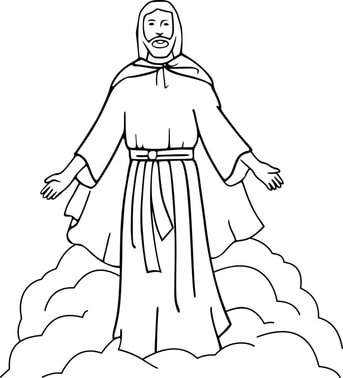 As a Spiritual Director, I’m on the lookout for “fake Jesus.” Whether during the very first session or sometime later through conversation, Ignatian contemplation or other kinds of guided prayer, the Jesus that a person has internalized arises. Remember, a person doesn’t have to be a Christian to have an image of Jesus that dwells within them, impacting the way they think about or view anything Jesus-related. Our image of Jesus, like our image of God, matters. This image is often pieced together in childhood. Early paper cutouts with fuzzy backs stuck to flannel boards, the voice and actions of a parent, pastor, or Sunday School teacher, experiences in Vacation Bible School, childhood books and pictures... In fact, it appears that even the Gospel writers may have pieced together a “Jesus” that didn’t always align with the authentic Jesus. Stephen Mitchell in his book, The Gospel According to Jesus: A New Translation and Guide to His Essential Teachings for Believers and Unbelievers, reveals how the early church writers included not only words and actions that Jesus likely said and did (since he didn't write anything down himself), BUT they also included words and actions they and their community needed him to say or do to fit their own beliefs! If what “Jesus” says is in opposition to the authentic Jesus’ main teachings (especially loving God and your neighbor as yourself), there’s a good chance the writer is making Jesus in his own image. This same “making-Jesus-in-our-own-image” and having him align with our own beliefs is on blatant display this political season! Now rather than being threatened by Mitchell’s idea, I find it’s helpful in developing skills in discernment. Remember, Scripture is “living” which means it “speaks” to us as we wrestle with it (which is to join in the lineage of the literal name of Israel!). It changes as we change and grow. Try living with a particular text, a story, a single Scripture for a month and notice how it changes (& how it changes you)! There is no end to new and deeper insights. Back to our images of Jesus…these images are rarely questioned. When an internal voice is associated with Jesus, a person automatically thinks it’s Jesus! So rather than simply agreeing with them, I listen to the person describe their interaction (always keeping in the back of my mind Jesus’ authentic teachings and his nature as revealed by his authentic teachings). Sometimes I’ll hear them say things like “Jesus has to knock me upside my head to get my attention.” If during a guided prayer, a door or a place of darkness often appears, “Jesus” will tell them not to look or go through it, to only focus on the light. Curiosity is helpful here. I’ll ask, “Whose voice does Jesus’ remind you of?” or “Why don’t you go back into your imagination and simply observe Jesus for a moment, what do you see?” Every single time, there is surprise. The response is often: “My whole life I thought it was Jesus’ voice I was hearing but it was actually my father’s!” "Oh wow, now that I'm looking closer, He looks like a flannel board Jesus. Kind of flimsy, not able to open the door.” “Jesus doesn’t really have much substance, he’s ghost-like, but as I watch he’s becoming more human.” And when Jesus becomes more human, more of his authentic self, they experience His great tenderness and strength. In doing so, their own tenderness and strength is called forth. With this Jesus, they find they are able to open doors and enter into places of darkness they never thought they could. With this Jesus, they are able to love the parts of themselves and the people they never thought possible. In other words, in coming in contact with the authentic Jesus, they are able to love their neighbor as they love themselves! 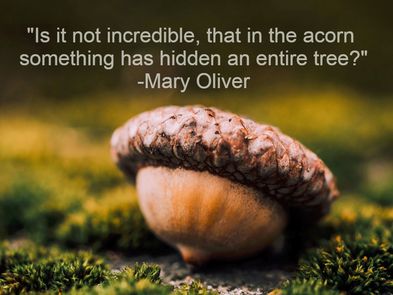 "Look deep into nature, and then you will understand everything better." -Albert Einstein This may very well be one of the reasons Jesus prayed outside so much! Whether on a mountain or on the side of one, in the wilderness, desert, or garden, Jesus found quiet places in creation to be alone with God the Father. He also encouraged people to observe nature to discover the deeper messages and invitations of God, instructing them to "notice how the lilies grow" or "look at the birds in the sky." (Matthew 6:25-34) All of nature is speaking! Whether individual parts or the rhythms and cycles of creation, if we observe using all of our senses and spend some time reflecting, we can discover what nature knows. With notebook or journal in hand, you might try the following prayer exercise and see what the Spirit of God has to say to you about your particular worries, stresses and concerns. What wisdom for your life is to be discovered in a single acorn or the falling leaves? Find out! How would you describe your November and December?
Now shift your attention from your own experience of November and December to nature's experience.
Give thanks for God's gift of (and the wisdom found in) nature! If there's a way to bless and care for creation, do it!  Imagine walking into a doctor's exam room, telling the doctor your symptoms, showing the doctor what you're concerned about and then... turning around and leaving without letting the doctor respond! It may sound far-fetched to you but we do it all the time in prayer. Soren Kierkegaard the 19th century Danish philosopher, theologian and poet once said, "If I were a physician, and if I were allowed to prescribe just one remedy for all the ills of the modern world, I would prescribe silence. For even if the Word of God were proclaimed in the modern world, how could one hear it with so much noise? Therefore, create silence." How often do we turn to the Great Physician with our concerns, yet offer no opportunity for a response? With no response, how are we to know what we really are to say or do, especially in the face of tragedy and difficult circumstances? Oh, we may think we know what to say or do. Our ego self or what the Apostle Paul called "the flesh" always has an answer! This part of us likes to self-diagnose (and diagnose others!). It's usually quite sure of itself, quick to demonize those who do not agree, and usually lacks creativity, like choosing apathy. Apathy is quite different than active waiting, for the latter keeps vigilance while the former has "fallen asleep," sure to miss God's invitation to action when it does come! If we read I Corinthians 3:4-5 and simply turn each phrase of what love is to what it isn't, we get a quick and easy way to recognize when the ego is trying to take charge! The ego often... is not patient. is not kind. envies. boasts. is proud. is rude. is self-seeking. is easily angry. keeps a record of wrongs. It's hard to stop talking, look inside, and give up all of these ego-driven things in order to create space to listen to the One who truly knows the next word or action needed. Don't think it's difficult?
Words often arise from those very places when it comes to the difficult person or situation. BUT, if you can allow that part of the ego (the part that is impatient, for instance) to step aside or tone down, this creates space for silence where there's room for the Physician to speak. In the doctor's office, the doctor gives you instructions on what to do (or not to do) and the kind of medicine to take. Do you let the words go in one ear and out the other or go home and leave the prescription on your kitchen counter? No! Not if you trust the doctor. There is action involved beyond rehearsing your symptoms and having a prescription in hand. In prayer, not only is the word spoken to you by the Physician powerful, but the word given to you to speak (or do) carries that same healing power forward. Says, Henri Nouwen in The Way of the Heart, "A word with power is a word that comes out of silence. A word that bears fruit is a word that emerges from the silence and returns to it...A word that is not rooted in silence is a weak, powerless word that sounds like a "clashing cymbal or a booming gong." (I Corinthians 13:1) Our world is in desperate need of wisdom and healing. So many of us say, "I'm praying." What if we said, "I'm listening in prayer." Then, let's actually stop talking, go to a quiet place (like Jesus did), and find out what the Physician has to say. Do you really think more thinking is needed right now? Especially when what we're dealing with is a sickness of the mind! With sad eyes the soul whispers “Stop” (as it always has) Did Saint Paul not say the same to the good folks of Galatia? With a humble heart (admitting the -ism existing in yourself) sit in Silence Without mistaking such Silence for absence or worse, indifference! The soul knows how to wait for salvation from its Source. And do you remember Jesus speaking to his disciples-- What does it take for some demonic powers to leave? Prayer and fasting. So ask, then close your lips and listen. Until clenched fists open until anxiety and anger slip through your fingers Until you receive in your now-ready head, heart, and hands that which you are to give for the healing of this, your world. 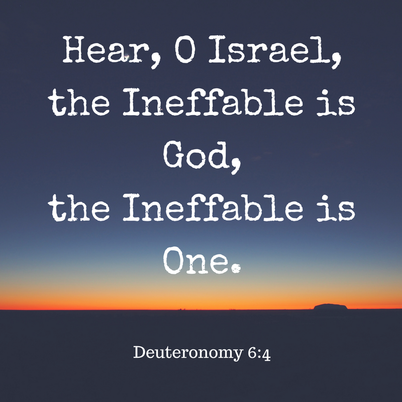 Remember those moments of synchronicity I spoke about last week? Well I had another string of "meaningful coincidences" I want to pay attention to and share. At the end of the class on the heart of Jewish spirituality at Congregation Ohabai Sholom, Rabbi Rami Shapiro was asked what practice he would suggest for all of us. His answer was to enter more deeply into the "Sh-ma Yisrael," also known as the Shema, the prayerful recitation of Deuteronomy 6:4-9. Remember, another Rabbi's answer was the same...Jesus told others to live into the Shema, calling it the greatest and most important commandment of all. Here is the Complete Jewish Bible's translation: 4 “Sh’ma, Yisra’el! Adonai Eloheinu, Adonai echad [Hear, Isra’el! Adonai our God, Adonai is one]; 5 and you are to love Adonai your God with all your heart, all your being and all your resources. 6 These words, which I am ordering you today, are to be on your heart; 7 and you are to teach them carefully to your children. You are to talk about them when you sit at home, when you are traveling on the road, when you lie down and when you get up. 8 Tie them on your hand as a sign, put them at the front of a headband around your forehead, 9 and write them on the door-frames of your house and on your gates. Two ways of entering more deeply into the Shema that Rabbi Rami mentioned were the mezuzah and breath prayer.
While I plan on getting a mezuzah, I began that night to breathe in and out each word of the Shema. The next day my family ate at a local restaurant and two Jewish women came up to our table out of the blue to offer encouragement to me. Why? I have no idea. Curious. I joked with Russ that they could sense I had been praying the Shema! Afterwards I went home, read a message from a friend who had asked me to recommend a Frederick Beuchner book. After recommending a few, I walked upstairs to my bookcase and spotted the first Beuchner book I had ever read, A Room Called Remember. The last time I read it had been well over a decade. Randomly I opened it up and what did I see? Staring back at me was Deuteronomy 6:4-7...the Shema! Under the Scripture, Buechner writes, "'Hear, O Israel!' says the great text in Deuteronomy where Moses calls out to his people in the wilderness. Hear, O Israel! Hear! Listen! And not just O Israel, hear, but O World, O Everybody, O Thou, O every last man and woman of us because we are all of us called to become Israel by hearing..." As I mentioned last week, synchronicity beckons us to pay attention! The word "Shema" means "Hear!" and this isn't just the gathering of sounds which can go in one ear and out the other. Watch the short animation below for a fantastic word study on "Shema" by The Bible Project. Given the meaning of the word and how it keeps coming up, clearly I'm to hear something! Perhaps there's something here for you, too. You may have read Adonai translated as LORD, but it can also be translated as The NAME, or Ineffable. Why? Watch the second short animation for a great explanation of the word's background. In addition, not only was the Divine Name so sacred that it was not to be pronounced, but some Jewish scholars taught that YHWH was ineffable because it was not a pronounceable word at all...it was the sound of breathing! This would go along with the name's etymology, God's Name does not indicate a being but Being itself. And this is beyond words! You might muse over God's Name, breathing and existence for a little while... Now for the breath prayer. If you've never heard the words of the Shema spoken in Hebrew, you can listen to them being read and sung here. Practice silently saying the words with a slow, relaxed inhale and exhale. In breath- Shema (pronounced Sheh-MA) Out breath- Yisrael (Yis-rah-EL) In breath- Adonai (Ah-do-NAI) Out breath- Eloheinu (Eh-lo-HEY-noo) In breath- Adonai Out breath- Echad (Eh-KHAD) As we regularly breathe the prayer, the hope as Rabbi Rami points out is to help one's consciousness to shift so one sees God in, with, and as all reality and one's interactions with others are marked with compassion. May it be so.  Or the imagination? How about touch? Or silence? Well the obvious answer is no one. But many Christians act as though they are forbidden territory. If it's anything other than the Bible and words (and even those are under regulation) it's to be feared. When I mention Centering Prayer or Reiki there are those who say "Oh isn't that New Age or Eastern? I can't do that, it's dangerous, I could be opening myself up to the Devil." I once heard a well-meaning pastor urge his congregation to trust God rather than the imagination thus setting the imagination in opposition to its Creator. It's not the imagination itself that is the problem, it's where we let it go. Saint Ignatius was transformed by God through his imagination in the 14th century and so developed spiritual practices to engage Scripture and prayer in this way. Elijah did not hear the voice of God in the earthquake, wind or fire but in the sound of sheer silence. Jesus made seeking out a quiet place (to listen to the Father who spoke within him) a regular spiritual practice. Jesus also touched people and they were healed (and the way he went about healing was different depending on the situation and person). He breathed on his disciples before telling them to receive the Holy Spirit (the name for Spirit in both the Hebrew and Greek can also mean "breath"). Much of his ministry looked more "Eastern" than "Western." There are some religions and traditions that have done a better job incorporating things like silence and the body into their spiritual practices. Rather than allowing fear from keeping us from receiving a gift, we can learn from them. With discernment (sifting wheat from chaff), we can integrate, or more likely recapture, what's been missing in our own tradition. Questions arising from the Biblical narrative can help us with the sifting. If we're to love God with all of our heart, mind, soul and strength, I think we need to humbly leave space for "holy envy." Theologian and scholar, Krister Stendahl coined this phrase, referring to the practice of recognizing and admiring elements in another religious tradition, even allowing those elements to enrich one's own faith tradition (or wishing it could). As a United Methodist, I've experienced holy envy in denominations like Episcopalian, Lutheran, Presbyterian, Southern Baptist, and others. As a Protestant, I've experienced holy envy with Catholic, Orthodox, Celtic Christian and Saint Thomas Christian practices and beliefs. As a Christian, I've experienced holy envy in Judaism, Buddhism, Hinduism, Sufism (mystical Islam) and others. And without exception, the places of holy envy have invited me to a deeper awareness and experience of the love of God, neighbor and self. No one owns breathing, imagination, silence, the body, or even truth (this is not to say that all religious truth claims are equal, but that truths are found in all religions). Rabbi Rami Shapiro closes his emails with "Alles iz Gott." He wants to remind me or whoever else emails him looking for wisdom that, "All is God" because God embraces, transcends and is the source of everything! And our Creator is amazingly generous (as Matthew 5:45 reminds us that the rain falls and sun shines on everyone). So with your heart, mind, soul and strength listen and learn. Allow yourself to remain open to holy envy. Discern. Let go, discover anew, or integrate. And find yourself further on the path of Shalom, this already-not yet living into the Kingdom of God where individuals, communities and all of creation experience wholeness, peace and completeness...and a holy sigh of relief! |
AuthorKasey is a scarf, ball and club juggling spiritual director just outside of Nashville, TN. Play helps her Type-A, Enneagram 1 personality relax, creating space for poetry and other words to emerge. She also likes playing with theological ideas like perichoresis, and all the ways we're invited into this Triune dance. Archives
September 2023
Categories
All
|
By clicking “Sign up for E-News” I consent to the collection and secure storage of this data as described in the Privacy Policy. The information provided on this form will be used to provide me with updates and marketing. I understand that I may modify or delete my data at any time.
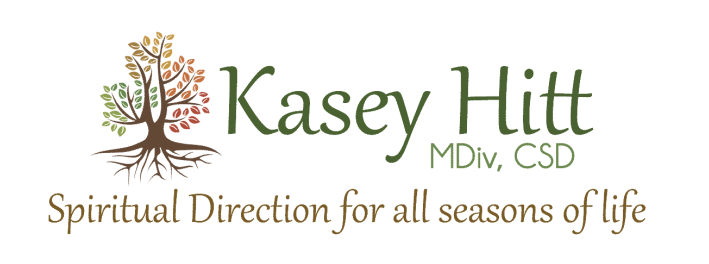
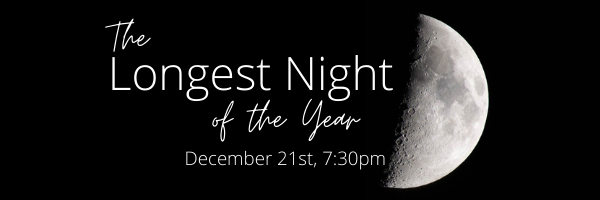
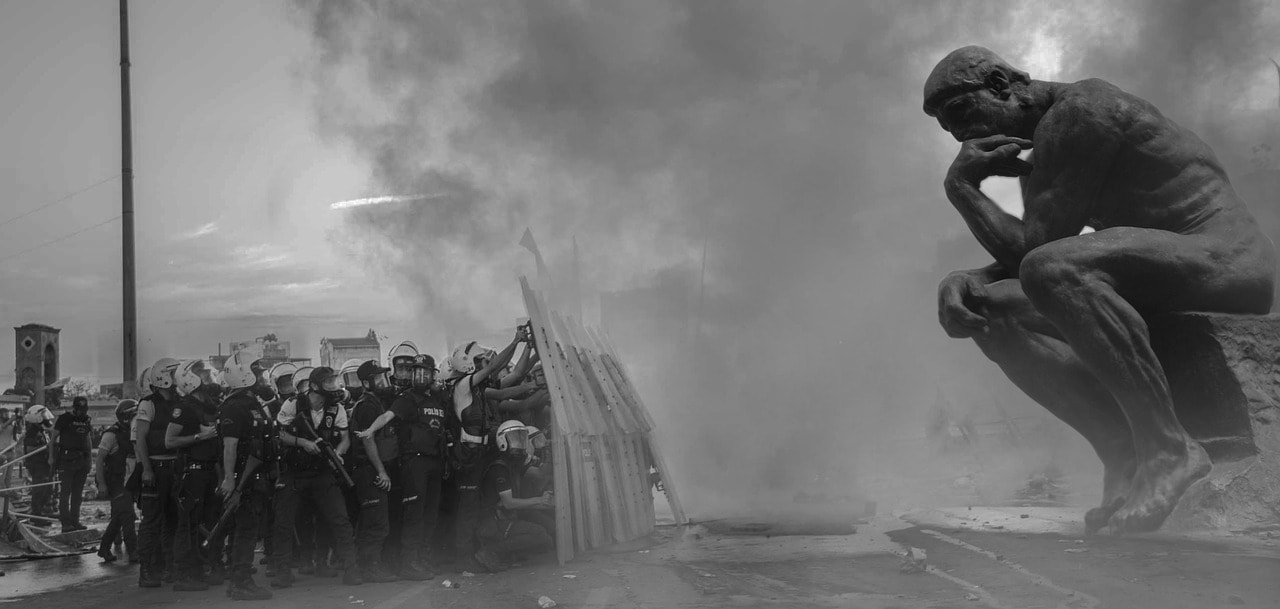
 RSS Feed
RSS Feed

